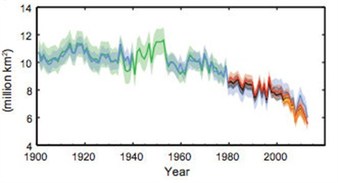|
“It’s like we are on the Titanic heading right for the iceberg, and for some reason, we are simply just rearranging the chairs on the deck, and not trying to stop the ship from hitting the iceberg.” After attending some talks and press conferences at COP20 about climate change and the Arctic, it is becoming increasingly obvious to me that while it is critical that we slash emissions of carbon dioxide, we cannot forget about methane. As a greenhouse gas, methane is over 100 times more detrimental to the atmosphere than carbon dioxide when it is first released into the atmosphere. Due to increased melting of the Arctic ice sheet from continual warming, increased amounts of methane are being released into our atmosphere via melting of permafrost and vents on the ocean floor. There are alarming consequences if we leave this unchecked. We could see slower moving, more destructive storms, prolonged droughts, and torrential rainfalls in many places across the globe. Imagine the effect that this will have on infrastructure, the global economy, and society as a whole. Some have predicted that there will be mass chaos and conflict arising from the effects of an ice-free arctic.
It is time we implement measures that will slash emissions of greenhouse gases, remove carbon dioxide from the atmosphere, and slow the warming of the Arctic. If the Arctic stops warming, the thawing of the permafrost may slow and eventually stop, which would drastically cut methane emissions. There are some very interesting solutions that could prove to be viable options for us, including, but not limited to: ~ Carbon capture and storage ~ Increasing the amount of trees, algae and other vegetation around the world ~ Investing in cleaner, renewable energy sources, like solar and wind power On November 30, 2014, The New York Times printed an article about the grave realities of climate change, they stated, “Even with a deal to stop the current rate of greenhouse gas emissions, scientists warn, the world will become increasingly unpleasant. Without a deal, they say, the world could eventually become uninhabitable for humans.” The time to invest in and develop these measures is NOW! We simply cannot afford to wait any longer! It is crucially important to our future! WE MUST ACT QUICKLY AND DECISIVELY
0 Comments
Leave a Reply. |
Categories
All
Archives
March 2024
|

 RSS Feed
RSS Feed
